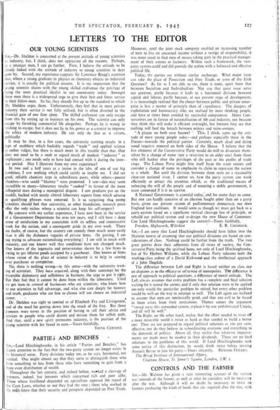PARTIE3 AND BENCHES
Sia,—Lord Hinchingbrooke, in his article "Parties and Benches," has drawn attention to the fact that the two-party system no longer exists in as historical sense. Party divisions today are, as he says, horizontal, not vertical. One might almost .say that they serve to distinguish those who have something to lose from those who have something to gain from a more even distribution of wealth Throughout the last century, and indeed before, weshad a cleavage of .nterests, indeed, but interests which concerned rich and poor alike. Those whose livelihood depended on agriculture opposed the repeal of the Corn Laws, whether or not they had the vote ; those who worked in he Mills knew that their security and prospects depended on Free Trade.
Moreover, until the joint stock company enabled an increasing number of men to live on unearned income without a vestige of responsibility, it was more usual to find men of means taking part in the practical management of their estates or factories. Within such a framework, the twoparty system could and did provide the nation with a balanced and effective political life.
Today, the parties are without similar anchorage. What major issue can take the place of Protection and Free Trade, or even of the Irish Question? As far as I am able to see, there is none, apart from that between Socialism and Individualism. Nor can that great issue serve our purpose, partly because it leads to a horizontal division between capital and labour, partly because, at our present stage of development, it is increasingly realised that the choice between public and private enterprise is less a matter of principle than of expediency. The dangers of exploitation and bureaucracy alike are realised by most thinking people, and have at times been avoided by successful compromise. Many Conservatives are in favour of nationalisation of tht coal industry, not because they think this will make it efficient overnight, but because they see that nothing will heal the breach between miners and mine-owners.
"A plague on both your houses! " This, I think, sums up the attitude of most young people today—and perhaps especially those in the Forces—towards the political parties. Certainly, much dead and dying wood requires removal on both sides of the House. I believe that the live elements of the Conservative Party would do well to dissociate themselves by a change of name (not a reversion to an older one) from those who still hanker after the privileges of the past or the profits of trade rings. The Labour Party might free itself from the trade unions and consider a change of name to emphasise its claim to represent the nation as a whole. But until the division between them rests on a reasonably clear-cut national issue, I cannot set how the patty system can work efficiently or attract the attention which, as the traditional means of enforcing the will of the people and of ensuring a stable government, it must command if it is to survive.
A National Government is essential today,'and for many days to come. But one can hardly conceive of an election fought other than on a party basis, given our present system of parliamentary democracy, nor does F.ngland love coalitions. It would seem as though we must get back to a party system based on a significant vertical cleavage line of principle, or rebuild our political system and re-design the new House of Commons. Can Lord Hinchingbrooke suggest the answer?—Yours faithfully,
Fresden, Highworth, Wiltshire E. R. COCHRANE.
SIR,—I am sorry that Lord Hinchingbrooke should have fallen into the Marxian heresy of assuming that our political divisions are based on considerations of class. Nothing could be further from the truth. The two great parties draw their adherents from all strata of society, the Conservative'Party being the spiritual home not only of Lord Hinchingbrooke, but of Sir Herbert Williams, while the Labour Party tolerates both the working-class ardour of a David Kirkwood and the intellectual approach of a John Dugdate.
The difference between Left and Right is based neither on class nor on disputes as to the efficacy or otherwise of monopolies. The difference is one of approach to political questions, a difference of moral attitude. The Left always assumes that every problem has a complete and final solution waiting for it round the corner, and if only that solution were to be applied not only would the particular probkm be solved, but every other problem would be well on the way to solutinn as well. The Left again are inclined to assume that men are intrinsically good, and that any evil to be found in them arises from their institutions. Thence comes the argument "sweep away thi3outmoded system, replace it by our prefabricated Utopia, and all will be well."
The Right, on tile other hand, realise that the effort needed to stave off a more miserable world is twice as hard as that needed to build a better one. They are not prepared to regard political solutions as moo per cent. effective, nor do they believe in subordinating everyone and everything to the demands of politics. Above all, they realise that whatever improvements are made must be modest in their dividends. There are no final solutions to the problems of this world. If Lord Hinchingbrookc took some notice of this distinction, he would think twice before inviting Aneurin Bevan to join his party.—Yours sincerely, RIMARD FIIILDEN.
The Royal Institute of International Affairs, Chatham House, St. James's Square, London, S.W. r.






















 Previous page
Previous page